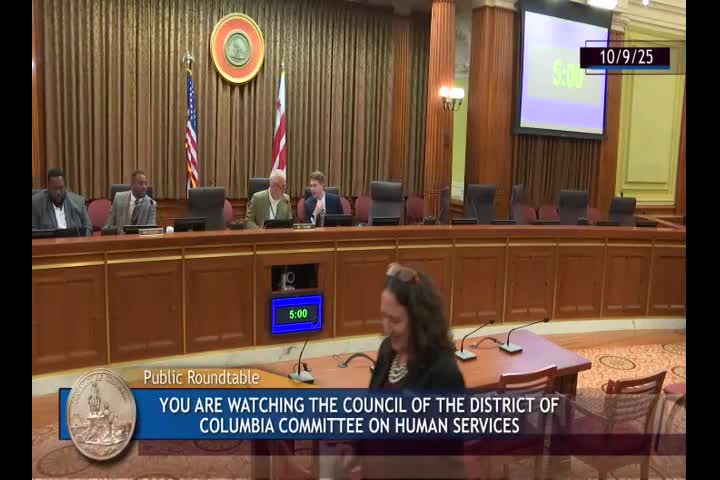Council presses DHS on slow lease-ups, voucher pipeline and shelter planning
Get AI-powered insights, summaries, and transcripts
Subscribe
Summary
At an Oct. 9 roundtable, council members and providers pressed DHS Acting Director Rachel Pierre on permanent supportive housing (PSH) voucher lease-up delays, the agency's plan to avoid gaps in voucher availability, and winter shelter capacity for families and singles.
Council members and service providers told the Committee on Human Services that the pace of moving people from matching to actual lease-up under the District's permanent supportive housing program has been too slow, creating budget and operational strain. Pierre told the committee DHS's goal is to lease households within 120 days of case manager assignment but that the fiscal year 2025 average was about 205 days.
Multiple witnesses pressed whether the voucher pipeline will dry up. Pierre said DHS has matched roughly all the vouchers available for singles this fiscal year and that about 500 matched single households remain to be leased up; she said the agency does not plan to match additional single households during FY26 but will seek more vouchers through next year's budget process. For families, DHS reported roughly 336 slots across PSH and TAH scheduled for matching this fiscal year and reiterated an intent to match those slots and get families leased up.
Providers and council members urged DHS to compress the steps that turn matched vouchers into signed leases. Witnesses told the committee the process can slip from days to weeks to months, requiring coordination among DHS, the housing authority, landlords and providers. Adam Mayer and others credited recent interagency meetings convened by Pierre as helpful but said more reform of operational steps is needed.
Shelter planning was a concurrent concern. Pierre said the district expanded single-bed capacity rapidly in response to a federal surge in August and currently has beds available; she emphasized DHS can activate additional hypothermia-season beds if needed. Committee members and witnesses flagged family shelter capacity as the more precarious issue: Pierre said the city plans to repurpose several sites back to family use and that the family system may see longer shelter stays while the agency prioritizes sustainable exits rather than speed.
Witnesses and Pierre described the 801 East shelter as a design the agency intends to replicate in the replacement New York Avenue shelter, including features such as on-site kitchens and "work beds" to accommodate residents who are employed. The council said it would maintain close oversight of voucher availability, leasing metrics and winter shelter activation plans.
